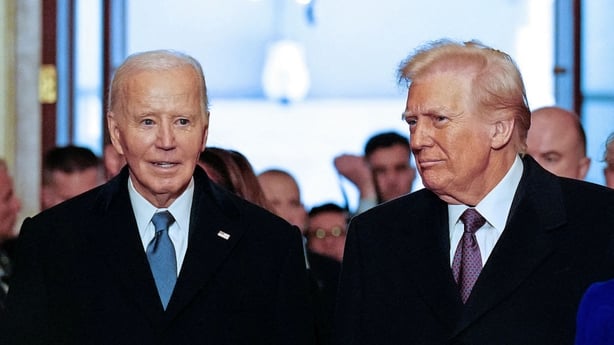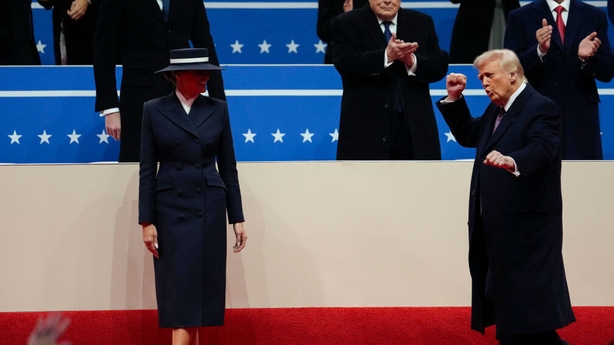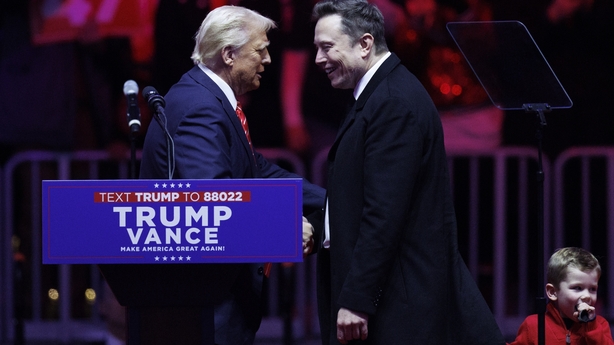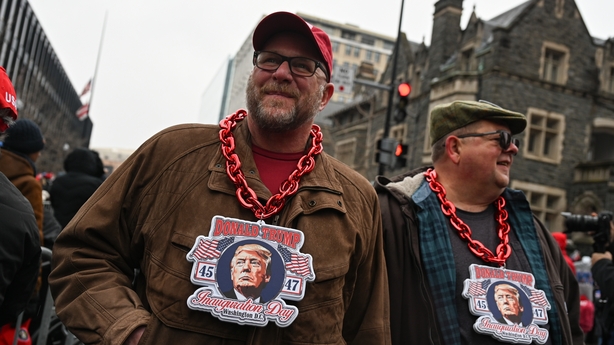Donald Trump has said he will issue a raft of executive orders aimed at reshaping how the United States deals with citizenship and immigration.
The 47th President will set to work almost immediately with a series of presidential decrees intended to drastically reduce the number of migrants entering the country.
"First, I will declare a national emergency at our southern border," Mr Trump said minutes after his inauguration.
"All illegal entry will immediately be halted, and we will begin the process of returning millions and millions of criminal aliens back to the places from which they came."
Watch: Donald Trump delivers his inauguration address in Washington
He said that he will send troops to the US-Mexico border "to repel the disastrous invasion of our country," he said.
Mr Trump, who campaigned on a platform of curbing migration and whose policies are popular with people who fret over changing demographics, also intends to end the centuries-old practice of granting citizenship automatically to anyone born in the US.
"We're going to end asylum," White House deputy press secretary Anna Kelly told reporters, and create "an immediate removal process without possibility of asylum. We are then going to end birthright citizenship."
The US Constitution grants citizenship to anyone born on US soil.
Ms Kelly claimed Mr Trump's actions will "clarify" the 14th Amendment, which addresses birthright citizenship.
"Federal government will not recognise automatic birthright citizenship for children of illegal aliens born in the United States," she said.
Read more:
What we know about Trump's planned executive orders
In pictures: Day of reverence, meticulous planning at Trump inauguration
Appointments cancelled
The first effects of Mr Trump's stance became apparent minutes after his inauguration when an app unveiled under president Joe Biden to help process migrants went offline.
"Effective 20 January 2025, the functionalities of CBP One that previously allowed undocumented aliens to submit advance information and schedule appointments at eight southwest border ports of entry is no longer available, and existing appointments have been cancelled," said a notice on the landing page.
US media reported 30,000 people had appointments scheduled.
Mr Trump's key adviser and noted immigration hardliner Stephen Miller took to social media to announce that the doors were shut.

"All illegal aliens seeking entry into the United States should turn back now," he wrote.
"Anyone entering the United States without authorisation faces prosecution and expulsion."
Ms Kelly said the administration would also reinstate the "Remain in Mexico" policy that prevailed under Mr Trump's first administration.
Under that rule, people who apply to enter the United States at the Mexican border were not allowed to do so until their application had been decided.
Death penalty
Ms Kelly claimed Mr Trump would seek to use the death penalty against non-citizens who commit capital crimes including murder.
"This is about national security. This is about public safety, and this is about the victims of some of the most violent, abusive criminals we've seen enter our country in our lifetime, and it ends today," she said.
Many of Mr Trump's first-term executive actions were rescinded by Mr Biden's administration, including one using so-called Title 42, implemented during the Covid pandemic preventing almost all entry to the country on public health grounds.

The changes under Mr Biden led to an influx of migrants, with images of thousands of people packing the border area.
Mr Trump frequently invoked dark imagery about how illegal migration was "poisoning the blood" of the nation, words that were seized upon by opponents as reminiscent of Nazi Germany.
Court challenges
While US presidents enjoy a range of powers, they are not unlimited. Analysts have said any effort to alter birthright citizenship will be fraught.
Aaron Reichlin-Melnick, a senior fellow at the American Immigration Council, said the 14th amendment was "crystal clear" in granting citizenship to anyone born in the United States with the exception of children of foreign diplomats.
"We have had birthright citizenship for centuries, and a president cannot take it away with an executive order," he told AFP. "We expect rapid court challenges."
Cris Ramon, immigration senior policy advisor at civil rights group UnidosUS, said the administration was "using a 'throw spaghetti at the wall' approach."
"We don't care whether this is legal or not," he said of the apparent attitude. "We're just simply going to do it and see if it survives the courts."
Triumpant comeback
Mr Trump's inauguration completes a triumphant comeback for a political disruptor who survived two impeachment trials, a felony conviction, two assassination attempts, and an indictment for attempting to overturn his 2020 election loss.
Mr Trump, the first US president since the 19th century to win a second term after losing the White House, said he would pardon "on Day One" many of the more than 1,500 people charged in connection with the 6 January 2021 Capitol riot.
Mr Biden, in one of his last acts, issued pre-emptive pardons for politicians and congressional staff who investigated the riot, along with police officers who testified.

Mr Trump will enjoy Republican majorities in both chambers of Congress that have been almost entirely purged of any intra-party dissenters. His advisers have outlined plans to replace non-partisan bureaucrats with hand-picked loyalists.
Unlike in 2017, when he filled many top jobs with institutionalists, Mr Trump has prioritised loyalty over experience in nominating a bevy of controversial cabinet picks, some of whom are outspoken critics of the agencies they have been tapped to lead.
He also has the backing of the world's richest man, Elon Musk, who spent more than $250m to help get Mr Trump elected.
'Stars and stripes on Mars'
Mr Trump also vowed that the world's biggest economy would again see itself as "a growing nation" that expands its territory, adding that the country would plant its flag on Mars.
"We will pursue our manifest destiny into the stars, launching American astronauts to plant the Stars and Stripes on the planet Mars," he said in his inauguration speech.
US policy will recognise 'only two genders'
Mr Trump said that his government's official policy would only recognise two genders, ending the current practice of providing a third gender option in some settings.
"I will also end the government policy of trying to socially engineer race and gender into every aspect of public and private life... As of today, it will henceforth be the official policy of the United States government that there are only two genders, male and female," he said.
Mr Trump also said that the United States would take back the Panama Canal, but he gave no further detail in his inaugural address after being sworn in.
"The purpose of our deal and the spirit of our treaty has been totally violated," Mr Trump said.

Mr Trump will be the first convicted felon to occupy the White House after a New York jury found him guilty of falsifying business records to cover up hush money paid to an adult film actor.
He escaped punishment at his sentencing, in part because the judge acknowledged the impossibility of imposing penalties on a soon-to-be president.
Winning the election also rid Mr Trump of two federal indictments - for plotting to overturn the 2020 election and for retaining classified documents - thanks to a Justice Department policy that presidents cannot be prosecuted while in office.
In a report released last week, Special Counsel Jack Smith said he had gathered enough evidence to convict Mr Trump in the election case if Mr Trump had reached trial.
